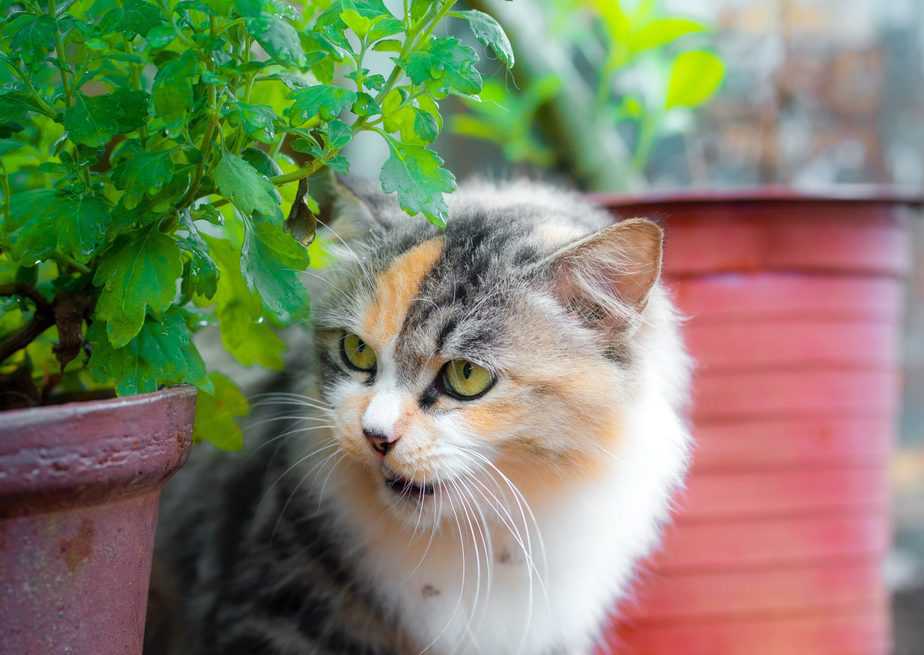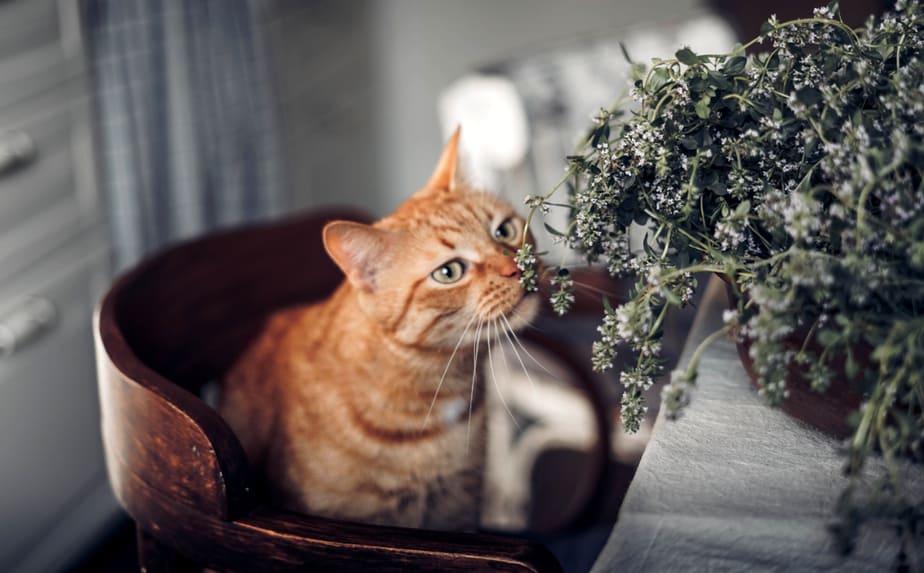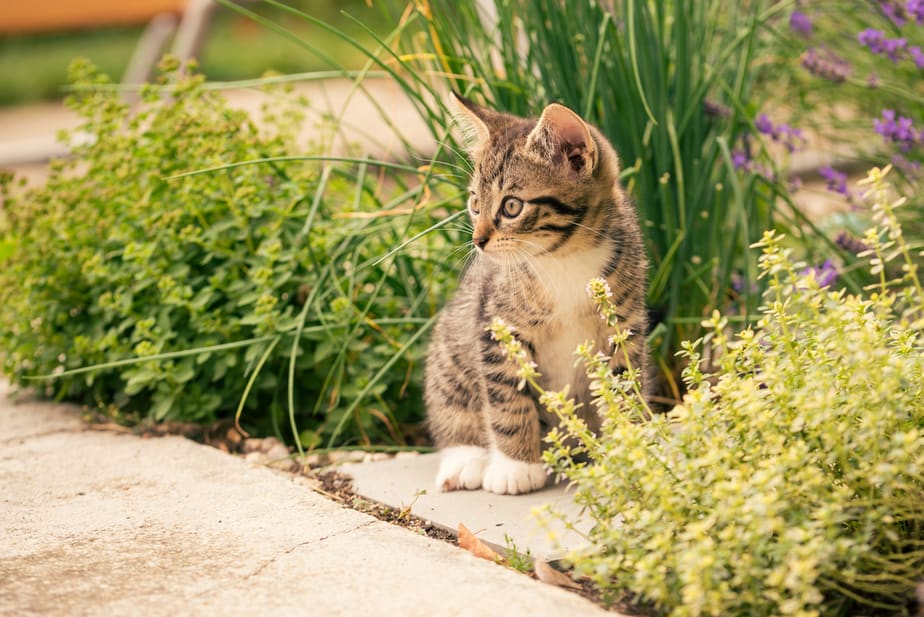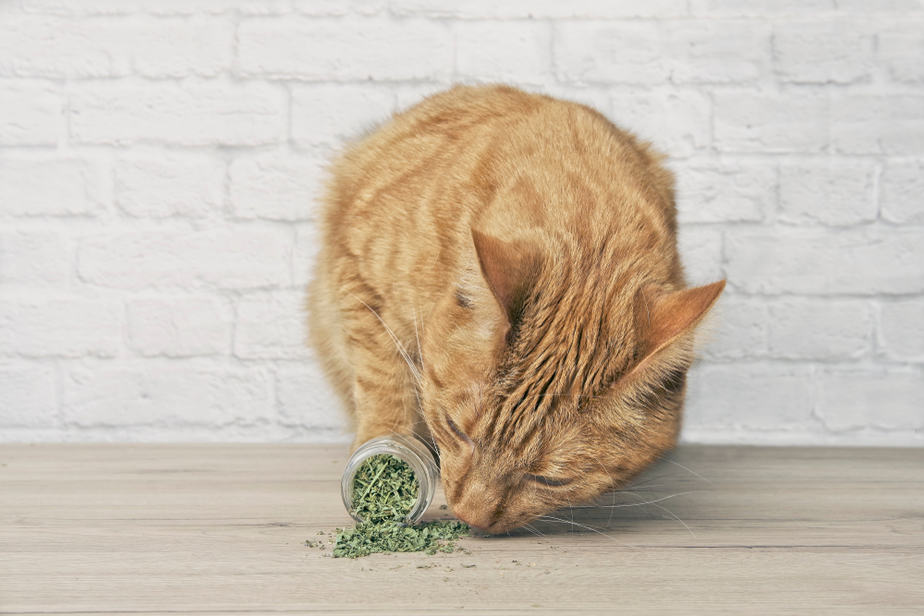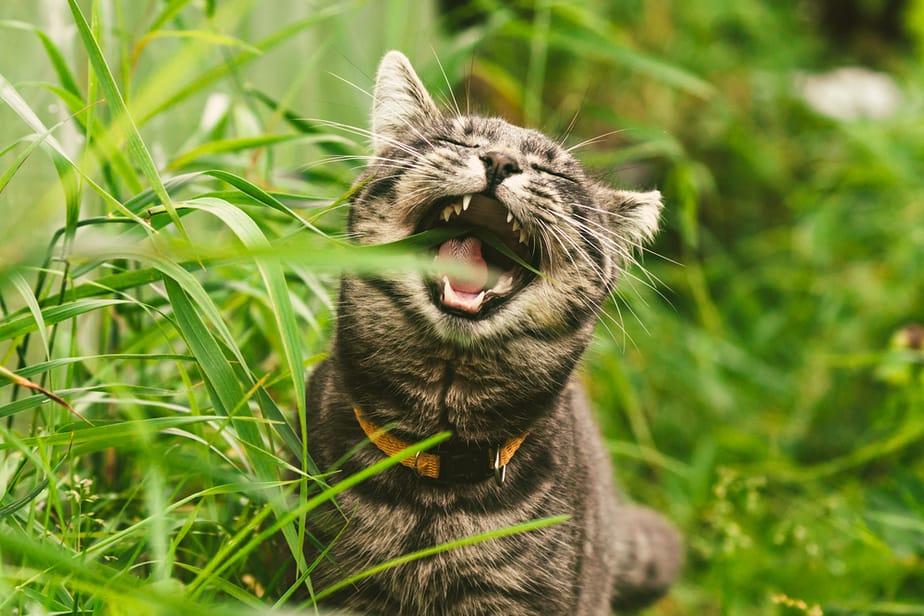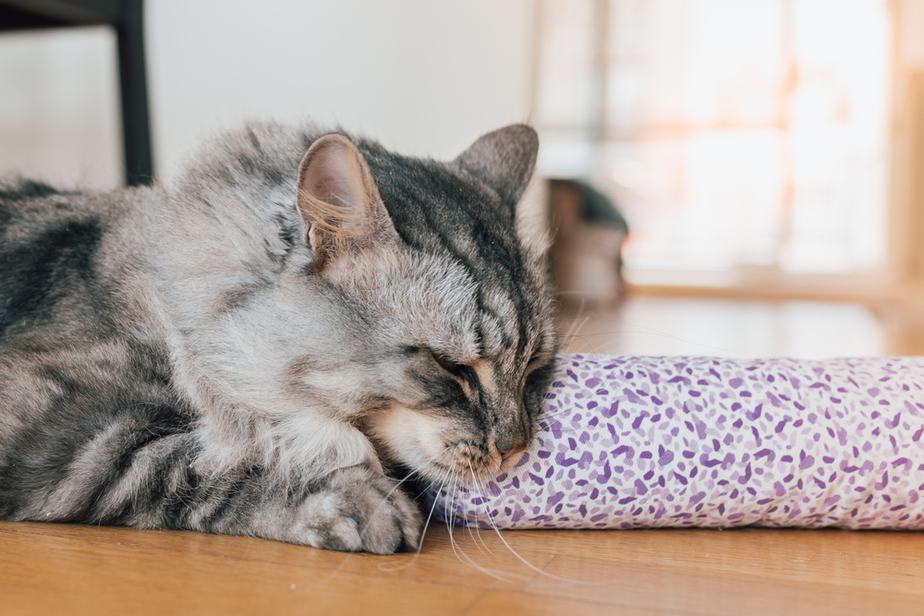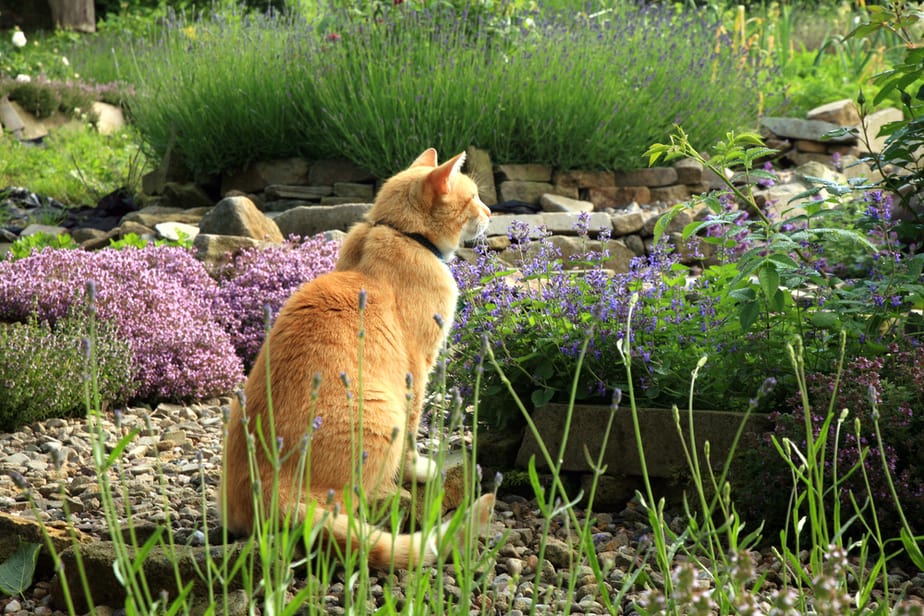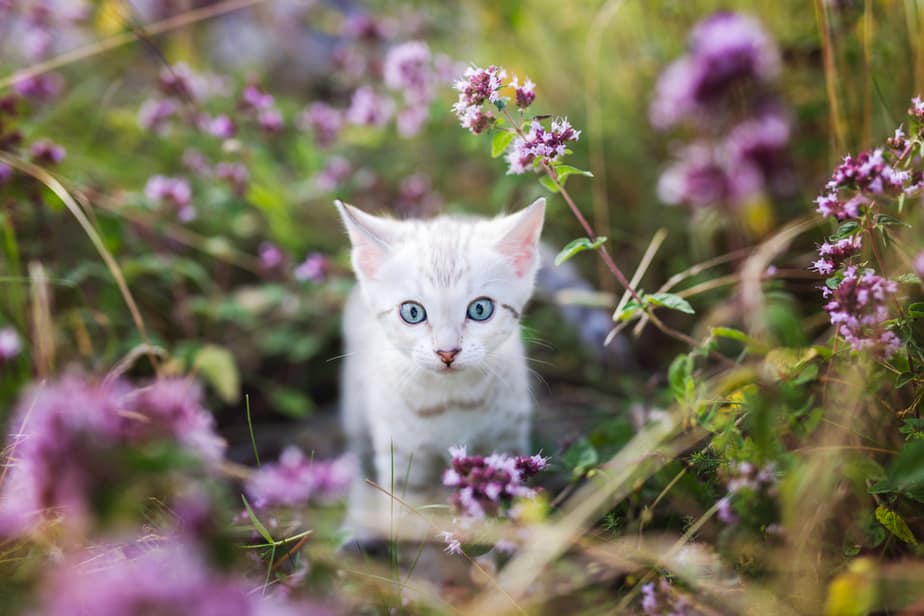📖 Table of Content:
Cats are notorious for munching on anything they can get their paws on! You might think your feline friend isn’t the biggest fan of herbs and greens, but you shouldn’t be surprised if you find her face first in your newest plant pot. But can cats eat thyme?
You shouldn’t be worried if your mischievous monster starts showing a sudden interest in this perennial evergreen. Not only are cats incredibly curious creatures, but they also get bored with regular cat food. And who could blame them!? But…
There’s always a but when it comes to feeding your feline friend anything that shouldn’t be a regular part of her diet. Unfortunately, herbs and greens can be incredibly damaging to your cat’s digestive system if she stumbles upon the toxic ones.
So, can cats eat thyme? According to the ASPCA (American Society for the Prevention of Cruelty to Animals) thyme isn’t on the list of toxic herbs! If your cat happens to nibble on this fragrant herb she shouldn’t experience any adverse reactions.
Does that mean you should go ahead and throw a thyme tea party for your precious purrincess? Unfortunately no. While thyme isn’t harmful to cats, there are a couple of things you should consider before introducing it to your cat’s diet.
Time for thyme
Thyme might not be as popular as catnip in the feline world, but that shouldn’t stop you from exploring the amazing nutritional and health benefits it brings to the table. So, what exactly is this aromatic leafy green?
Thyme is a part of the mint family Lamiaceae. It’s best known for its culinary and medicinal use. It’s a close relative to oregano, which is considered unsafe according to the ASPCA. Things aren’t looking up when it comes to your ‘‘Can cats eat thyme?’’ question!
While there are different types of thyme, Thymus Vulgaris is the one that’s most commonly cultivated and used among humans. It’s typically used to add color and flavor to different foods. And that’s not even the most exciting part about this herb.
Thyme contains a lot of antioxidants that can calm the nervous system. It can help improve the immune system, fight against bacterial infections, reduce symptoms of throat irritations and coughing, and act as a mood booster… For humans.
But, is thyme safe for cats? Not only does the ASPCA recognize thyme as non-toxic to cats, but the FDA (Food and Drug Authority) also categorizes it as generally safe for feline consumption. Can you hear your curious creature meow with excitement?!
But, wait a minute… She might be meowing because she’s thinking about a completely different type of thyme! Cat thyme, or Teucrium Marum, is a shrubby, fragrant plant similar to regular thyme. But, they’re not the same thing!
Unlike regular thyme, it’s quite unpleasant in odor and bitter in taste. While it isn’t a favorite among humans, cat thyme can be an excellent substitute for catnip. Feel free to give your cat a little taste and see how she reacts!
So, can cats eat thyme?
It’s quite clear that thyme isn’t your regular herb garden plant. It has a history of culinary, medicinal, and ornamental use. It’s also incredibly beneficial to humans because it contains a bunch of vitamins, minerals, and antioxidants. But, is it beneficial to cats?
Absolutely! Your feline friend might be a carnivore, but that doesn’t mean she can’t reap some benefits from an occasional thyme treat. Vitamins A and C, minerals like calcium and iron, and active components like thymol are only some of them.
How can cats eat thyme safely? There are many ways in which you could introduce thyme into your cat’s diet. If you get a green light from your vet, you can always garnish her food with a couple of fresh leaves or even sprinkle it with some dry, powdered ones.
1. Thymol
Three of the most important active components of thyme are thymol, carvacrol, and eugenol. Believe it or not, veterinary medicine typically uses thymol because of its anthelmintic and antibacterial properties. It’s safe to say that cats can and should eat thyme!
So, thymol makes thyme incredibly beneficial to your precious purrincess. It can help her get rid of internal and external parasites, clean her digestive tract, improve her digestive health, and suppress bacterial and fungal growth.
Here’s the thing. You should always consult with your vet before making any significant changes to your cat’s diet. That being said, an occasional thyme treat can help your cat get rid of worms and other parasites that might have found their way into her digestive tract.
Not only that, but it can also ensure the overall health of your cat’s digestive system. While you shouldn’t add thyme to your cat’s regular diet, there’s no reason why you shouldn’t let her go explore your herb garden every now and then.
Lastly, cats spend a huge chunk of their day grooming themselves. Chances are your precious purrincess accidentally swallows a bunch of her own fur which results in those pesky hairballs. Luckily for her, thyme and thymol can save the day!
2. Vitamins A and C
Cats are carnivores; which means they get most of their nutrients from other animals. They require a diet packed with meat, animal protein, and animal-sourced vitamins and minerals in order to survive. Does that mean your cat shouldn’t consume anything other than that?
Absolutely not. While it’s incredibly important for your cat to get most of its nutrients from other animals, there’s no reason why she shouldn’t get some of her daily vitamins and minerals from other sources. And since cats can eat thyme, this herb is an excellent source of vitamins A and C!
Vitamin A is an essential vitamin for your feline friend. This means she needs it to maintain proper function and optimal health. Vitamin A supports your cat’s immune system and helps protect her body against many dangerous diseases.
Vitamin C is synthesized in your cat’s liver. So, she doesn’t need vitamin C from other sources unless her liver isn’t doing a good job. Either way, this vitamin is incredibly important as it supports tissue growth and maintenance, boosts immunity, and triggers oxidative stress relief.
3. Minerals
Thyme is a great source of potassium, iron, calcium, manganese, magnesium, and selenium. If your precious purrincess was in the wild, she would be able to get most of these minerals from the bones, skin, and insides of her prey.
Since she’s in your bed taking her twelfth nap of the day, you’re the only one who’s responsible for making sure she gets her daily dose of minerals. Luckily for you, cats can eat thyme. An occasional thyme treat should do the trick!
Firstly, potassium is an essential electrolyte because it ensures the normal function of your cat’s muscles and nerves. Low potassium levels are incredibly dangerous because they might lead to something called hypokalemia.
Symptoms include muscle weakness, difficulty getting up and walking, loss of appetite, and constipation. If you notice any of these symptoms, you should contact your vet and schedule an appointment.
Secondly, iron can help boost your cat’s red blood cells. If you notice your cat has been eating soil, rocks, litter, or having other unusual food cravings; she might be experiencing iron deficiency (or even anemia).
And lastly, thyme contains a lot of calcium. Calcium is an essential electrolyte just like potassium. The AAFCO (Association of American Feed Control Officials) says that adult cats need 0.6% of their total diet to be calcium which makes thyme a great choice for your feline friend!
4. Dietary fiber
You might think your curious creature doesn’t require any fiber in her diet because she’s a carnivore, but you’d be wrong. Fiber-packed plants like thyme can help your cat with a variety of issues such as diarrhea, constipation, and diabetes.
It’s important to be careful when introducing fiber-packed plants (or fruits and veggies) to your cat’s diet. A little goes a long way! An occasional thyme treat should be able to provide your cat with a generous amount of fiber (14 grams per serving size).
Here’s the catch – if your cat consumes too much fiber in her diet she might experience serious digestive issues with symptoms such as stomach upset, diarrhea, and vomiting. You shouldn’t feed your cat with more than a couple of thyme leaves every now and then.
Cats can eat thyme, but…
It’s safe to say we answered your “Can cats eat thyme?” question to a tee, but there are a couple of things you need to take into consideration before adding this fragrant herb to your cat’s food bowl. So, let’s dive in!
Firstly, you shouldn’t let your cat eat too much of anything that isn’t supposed to be a regular part of her diet. Cats are carnivores which means they require meat, animal protein, and animal-sourced vitamins and minerals in order to survive. And you should stick to that as a general rule of thumb!
Herbs like thyme might make for a healthy treat, but they should only comprise around 10% of your cat’s daily food intake. If your mischievous monster finds her way into your herb garden she might experience digestive issues such as stomach upset, diarrhea, and vomiting because she lacks the necessary digestive enzymes.
Secondly, you shouldn’t let your cat eat thyme oil. While thyme isn’t toxic to cats, we can’t say the same thing about thyme oil. Most essential oils contain phenols which are incredibly dangerous for your feline friend.
If your mischievous monster licks or sniffs thyme oil she might develop irritating rashes and inflammation, allergic reactions, and seizures. Unfortunately, these are quite tame reactions in comparison with what she might develop if she is exposed to thyme oil over a longer period of time.
Lastly, you shouldn’t let your cat eat thyme that was sprayed with pesticides or herbicides as it might lead to poisoning. If you can’t find any organically grown thyme in your local market, you should try growing it yourself in your herb garden.
What other herbs are safe for cats?
You should consult with your vet before making any significant changes to your cat’s diet. There are so many herbs your cat might enjoy munching on in her free time, and you’re responsible for making sure she isn’t at risk of any allergic and adverse reactions.
With that disclaimer out of the way… Here’s a list of herbs and non-toxic plants you can use to add some variety to your cat’s regular diet:
1. valerian,
2. dandelion,
3. echinacea,
4. cilantro,
5. catnip.
Valerian is not only safe for cats but it’s also packed with nutritional and health benefits. If you have a chubby cat that doesn’t want to move from her favorite spot in the house, valerian might be the thing for you because it acts as a stimulant.
Dandelion is an excellent addition to your herb garden. Not only does it look adorable, but it helps boost your cat’s immune system, promote healthy digestion and ensure liver detoxification.
Echinacea or the purple coneflower is also safe for cats! If your feline friend is suffering from frequent respiratory infections you might want to add a couple of echinacea leaves to her food bowl.
Cilantro is packed with vitamins, minerals, and antioxidants that can boost your cat’s immune system, regulate her digestive system, and slow down the onset of serious diseases such as feline cancer.
Catnip doesn’t even need additional explanations! It’s the most loved plant in the feline world as it contains an essential oil called nepetalactone that drives them crazy (in the best way possible!).
Who said you couldn’t add color, flavor, and texture to your picky eater’s regular diet? Cats can be such little divas when it comes to their food, and this is a great way to prevent them from throwing a hissy fit!
What herbs are not safe for cats?
Cats can eat thyme, but… You shouldn’t let your cat go ham in your herb garden. There are many herbs and plants that aren’t recommended for feline consumption because they contain compounds that might prove toxic if consumed in excessive amounts.
Here’s a list of some of the most dangerous herbs and plants you’ll want to keep away from your precious purrincess:
1. onion,
2. garlic,
3. chives,
4. lemongrass,
5. chamomile,
6. mint.
Onion, garlic, and chives belong to the Allium family. Every member of this family contains compounds known as disulfides and thiosulphates, which are incredibly toxic to cats.
Firstly, they can cause oxidative damage to the red blood cells which can result in conditions like hemolytic anemia, Heinz body anemia, and methemoglobinemia. You might notice symptoms such as lethargy, pale gums, increased heart rate, and overall weakness.
Secondly, they can cause serious gastrointestinal diseases because your cat’s digestive system doesn’t contain the enzymes necessary to break them down. You might notice symptoms such as nausea, drooling, abdominal pain, vomiting, and diarrhea.
Lemongrass isn’t considered toxic to cats by the ASPCA, but it can be incredibly harmful if consumed in excessive amounts. And if that isn’t enough, lemongrass essential oil can be fatal! Unfortunately, your cat lacks a liver enzyme that helps to break down most essential oils.
Chamomile can also be incredibly harmful if consumed in excessive amounts. It contains a variety of potentially harmful substances such as tannic acid, anthemic acid, and volatile oil.
Mint leaves, flowers, and stems are unsafe for cats. If your cat nibbles on mint she might experience digestive issues such as vomiting and diarrhea. It’s safe to say your precious purrincess should stay away from anything that isn’t labeled safe by the ASPCA!
Final thoughts!
Cats can eat thyme! Not only is this perennial evergreen considered safe by the ASPCA, but it also contains a bunch of vitamins, minerals, and antioxidants. Your feline friend doesn’t need thyme in her regular diet, but an occasional treat shouldn’t cause any adverse reactions. Good luck!
